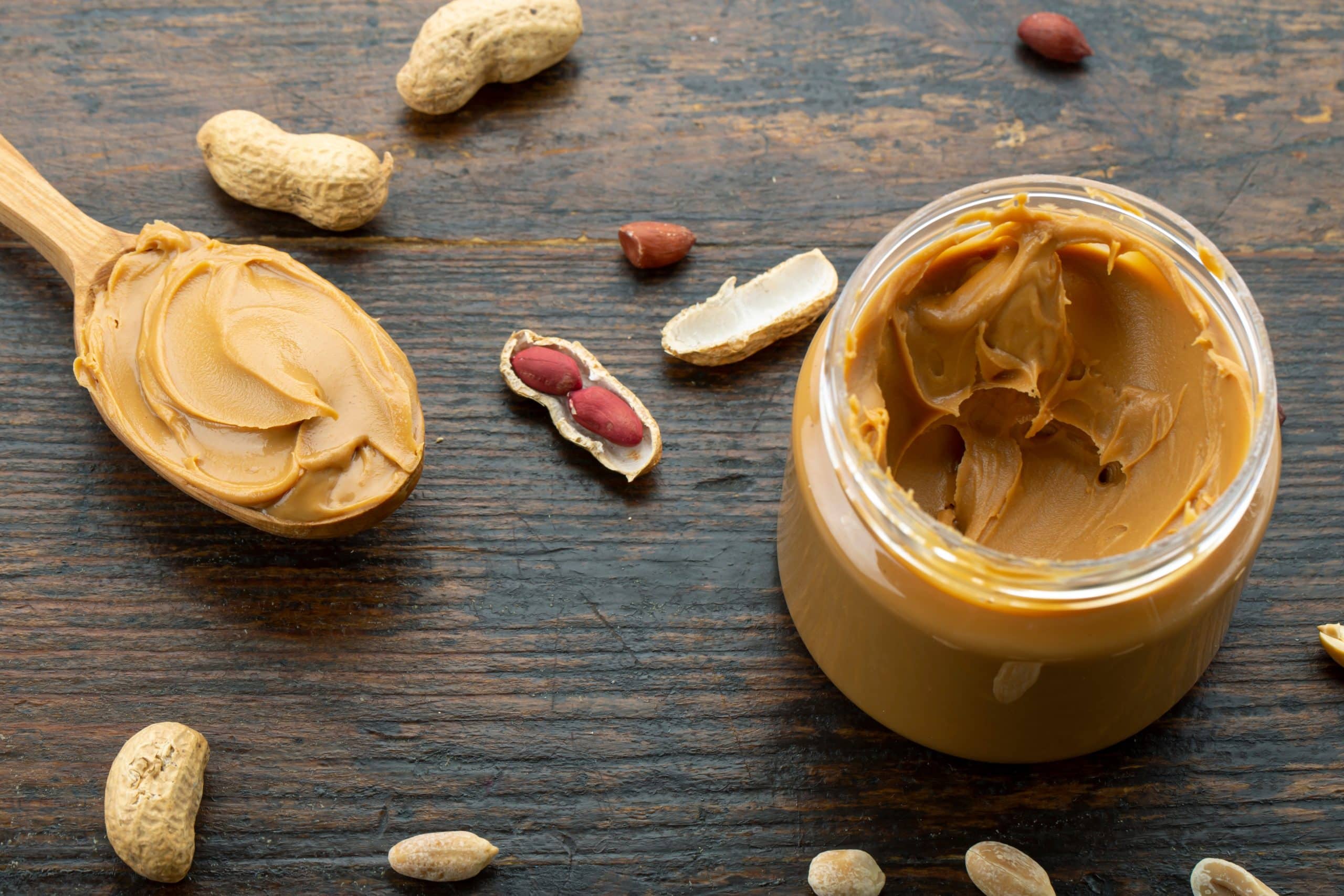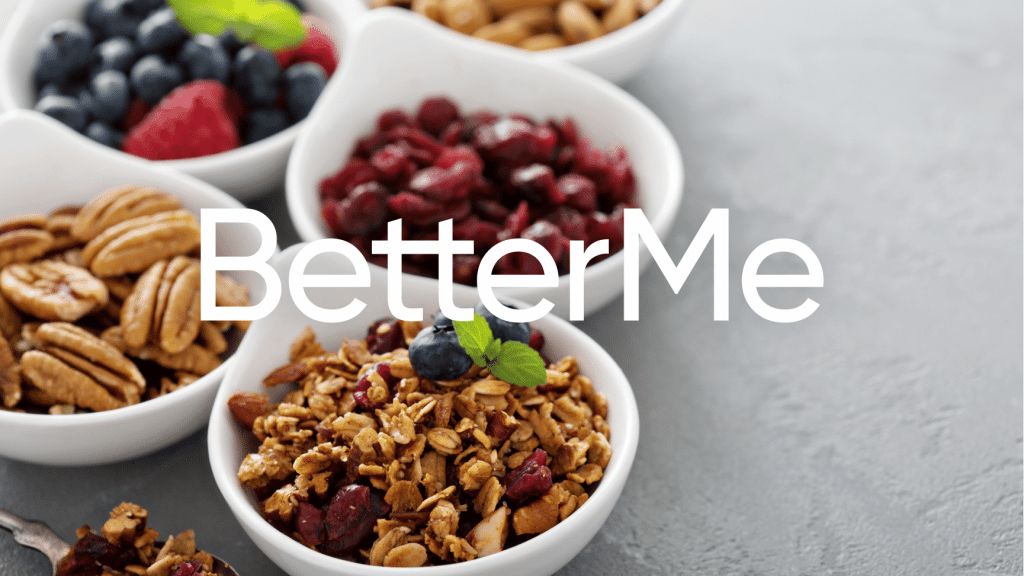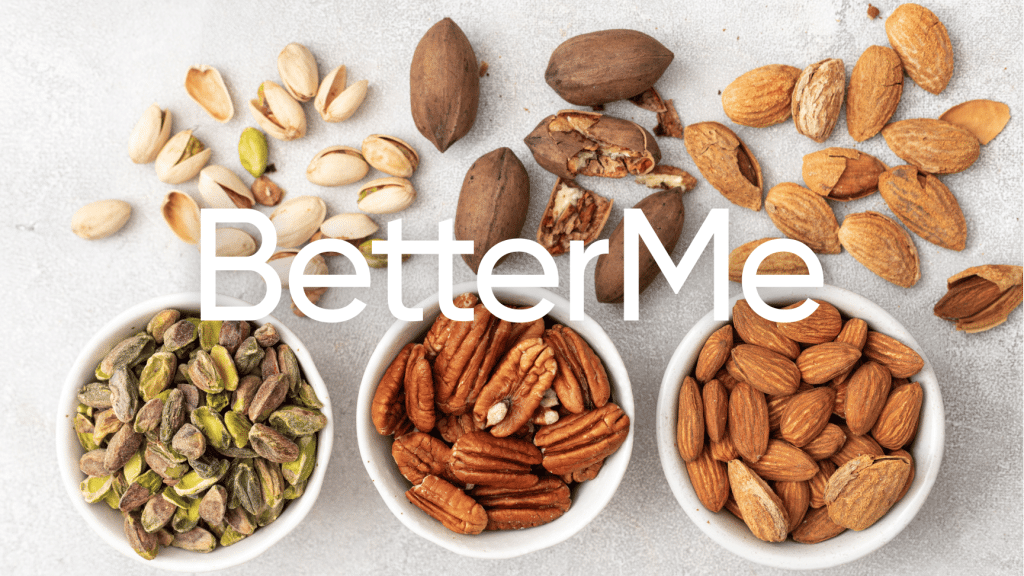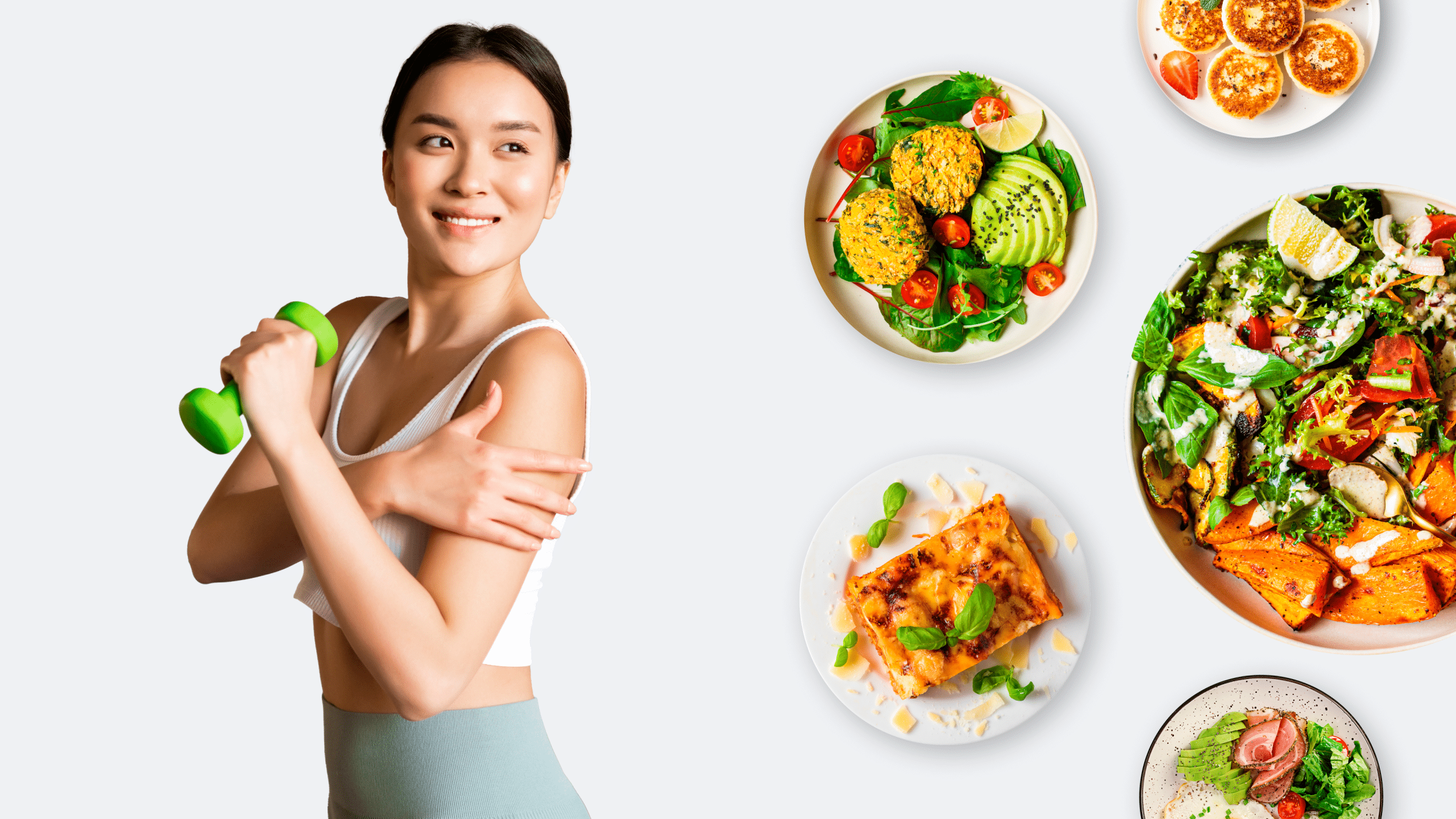Whether it’s the nostalgic PB&J sandwich or a more recent culinary creation like a keto fat bomb slathered in peanut butter, snack time is hardly ever complete without this classic spread.
Athletes, as well as people who lift for a hobby, know this, which is why they often turn to this trusty pantry staple for a quick energy boost.
But what about those of us on a weight loss journey? Is peanut butter a friend or foe?
With its high protein content and heart-healthy fats, one might think it’s a superfood. On the flip side, it’s also high in calories, which could make you second doubt adding it to your diet plan. With this in mind, what are the implications of peanut butter for weight loss or gain?
Let’s review the facts.
Is Peanut Butter a Protein or Fat?
Peanut butter protein count in a two-tablespoon serving is about 7.2 grams of protein, contributing to its reputation as a good source of protein (5).
However, it’s also high in fat, with the same serving size containing around 16 grams of fat (5). This fat is primarily monounsaturated and polyunsaturated fats, which are considered healthy fats.
Peanut butter also contains a modest amount of fiber (1.5 grams per serving) and sugars (3.4 grams per serving). Additionally, it’s rich in several other nutrients, like magnesium, which supports various bodily functions (5).
The calorie count in peanut butter is fairly high, with a two-tablespoon serving containing around 190 calories (5). Therefore, like any food, it should be consumed in moderation, particularly if you’re trying to maintain or lose weight.
Some brands may add extra sugar or oils to their spreads, which adds calories. Therefore, it’s recommended to choose natural, unsweetened versions whenever possible.
If you tend to let yourself off the hook, raise the white flag when things get tougher than you expected, send yourself on an unconscious binge-eating trip – BetterMe app is here to help you leave all of these sabotaging habits in the past!
Can I Eat Peanut Butter and Lose Weight?
Yes, you can eat peanut butter and still lose weight.
Despite being high in calories and fat, peanut butter can be beneficial for weight loss due to its protein content, fiber, and healthy fats. It’s not the peanut butter itself that will lead to weight loss, but how it’s incorporated into a balanced, nutrient-rich diet (8).
Use Peanut Butter For Satiety And Appetite Control
One of the key ways peanut butter can aid in weight loss is through its ability to promote feelings of fullness or satiety. This is largely due to its high protein and fiber content.
Protein is known to be the most filling macronutrient, and it can help reduce hunger and prevent overeating. Similarly, dietary fiber slows down digestion and adds bulk to meals, helping you feel satisfied longer (2). As such, incorporating peanut butter into your meals or snacks could help control your appetite and reduce overall calorie intake.
In addition, the healthy fats found in peanut butter also contribute to its satiating properties. Dietary fats slow down stomach emptying and can enhance the taste and texture of foods, which can help increase satisfaction and fullness (8).
However, it’s important to remember that while these fats are beneficial for health, they are also high in calories. Therefore, portion control is crucial when consuming peanut butter for weight loss. We have discussed additional peanut butter weight gain implications in another article.
Use Peanut Butter For Balanced Blood Sugar Levels
Peanut butter has a low glycemic index (GI), which means it causes a slower rise in blood sugar levels compared to high-GI foods (8). This is beneficial for people who need to manage their blood sugar levels, such as those with type-2 diabetes (1).
Use Peanut Butter For A Metabolic Boost
Eating peanut butter may also give your metabolism a slight boost. This is primarily due to its protein content.
Protein has a high thermic effect, meaning your body burns a few more calories by digesting it compared to fats and carbohydrates (10). This can slightly increase your metabolic rate, helping you burn more calories throughout the day.
So, while peanut butter is high in calories, it may also help enhance the number of calories you burn, supporting weight loss efforts.
Use Peanut Butter For Muscle Recovery And Building
The protein in peanut butter is beneficial for muscle recovery and building (9). After a workout, your muscles need protein for repair and growth.
Consuming peanut butter post-workout provides your body with essential amino acids necessary for muscle protein synthesis (9). Since muscle tissue burns more calories than fat tissue, increasing muscle mass can boost your metabolic rate and enhance weight loss.
Use Peanut Butter As A Healthy Swap For High-Calorie Foods
Peanut butter can serve as a healthier alternative to high-calorie, less nutritious foods. Instead of reaching for processed snacks that are often high in added sugars and unhealthy fats, opting for a moderate portion of peanut butter can satisfy cravings while providing beneficial nutrients.
For instance, using peanut butter as a spread on whole-grain toast or as a dip for fruits or vegetables can make for a satisfying snack that supports weight management.
Is Peanut Butter Good For Losing Belly Fat?
In the right quantities and paired with the right foods, peanut butter can help you lose belly fat. Its protein, fiber, and healthy fat content may help you control portions and reduce overall calorie intake (8).
Additionally, its slow-release carbohydrates can help keep blood sugar levels balanced, which in turn might help control food cravings or excessive hunger (1).
Keep in mind that any single food cannot be a miracle cure for belly fat. An overall balanced and healthy diet paired with physical activity is the key to achieving substantial weight loss results.
Read more: 13 Types of Fish To Eat for Good Health.
Can I Eat Peanut Butter Everyday on a Diet?
Yes, you can eat peanut butter every day on a diet. How much? A single serving of peanut butter is 2 tablespoons. The number of servings per day you can or should have depends on your calorie goals and your overall diet.
As for which peanut butter brands may be good for weight loss, consider the following while making a purchase:
- Choose natural, unsweetened versions. This will help ensure that you are avoiding any added sugars or oils.
- Look for varieties that list peanuts as the only ingredient on the label. Some brands may add other ingredients like sugar, salt, and palm oil. These can add unnecessary calories and may diminish nutritional value.
In terms of when to eat peanut butter for weight loss, there isn’t a definitive “best” time.
Some people may find it beneficial to consume it in the morning to help control hunger throughout the day, while others might prefer it as a satisfying afternoon snack. What matters most is that it’s consumed as part of a balanced diet that aligns with your calorie needs and weight loss goals.
While using peanut butter for weight loss, it’s about more than just the spread itself. It’s about how it fits into your overall diet
For instance, adding peanut butter to a meal high in refined carbohydrates (like white bread) won’t do much good. But pairing it with whole grains, fruits, or vegetables can make for a balanced meal that promotes satiety and helps regulate blood sugar levels.
There isn’t a specific “3-day peanut butter diet plan” for weight loss, peanut butter can be incorporated into a healthy eating plan. This could look like adding a tablespoon of peanut butter to your morning oatmeal, spreading it on whole-grain toast for a snack, or including it in a post-workout smoothie for added protein.
That being said, there isn’t really a “best time to eat peanut butter for weight loss.” It will ultimately depend on your preference and weight loss goals.
What Are 3 Benefits of Eating Peanut Butter, Beyond Weight Loss?
Aside from weight loss, is peanut butter good for you? It is also a source of essential nutrients, has heart-healthy compounds, and may just be the solution for better brain health:
Powerhouse of Essential Nutrients
Peanut butter is a nutrient-dense food packed with a variety of essential vitamins and minerals. It offers significant amounts of magnesium, phosphorus, and zinc (6). These minerals play vital roles in the body.
Magnesium is crucial for energy production and bone health, phosphorus is necessary for the formation of DNA and cell membranes, and zinc supports immune function and wound healing (7).
Moreover, peanut butter also provides a good amount of vitamin E, a potent antioxidant that protects the body against damage from harmful free radicals. The presence of B vitamins aids in the metabolism of fats, proteins, and carbohydrates for energy use (6).
Simply put, incorporating peanut butter into your diet can help ensure you’re getting a wide range of nutrients needed for overall health.
Heart Health
Regular consumption of peanut butter may support heart health due to its high content of monounsaturated fats.
These are often associated with a decrease in blood cholesterol levels and a reduced risk of heart disease. When they replace saturated fats in the diet, monounsaturated fats help lower bad cholesterol (LDL) while raising good cholesterol (HDL), promoting balanced cholesterol levels (6).
Additionally, peanut butter contains polyunsaturated fats, including omega-6 fatty acids, which are essential fatty acids. Eating a balanced amount of these healthy fats can help maintain a healthy cardiovascular system, making peanut butter a heart-friendly choice (6).
Brain Health Booster
Peanut butter could also play a role in maintaining brain health. It is rich in healthy fats and contains resveratrol, an antioxidant that has been linked to brain health (6).
Healthy fats are essential for brain function as they are necessary for maintaining the structure and function of neurons (3).
Additionally, resveratrol has shown potential to protect the brain against damage. It’s thought to have neuroprotective properties that could help reduce the risk of neurodegenerative diseases (4).
While more research is needed in this area, current evidence suggests that including foods like peanut butter in your diet could contribute to long-term brain health.
BetterMe app is a foolproof way to go from zero to a weight loss hero in a safe and sustainable way! What are you waiting for? Start transforming your body now!
Frequently Asked Questions
How Much Peanut Butter Is Too Much?
Is eating peanut butter every day okay? Well, a typical serving size is two tablespoons, which contains around 190 calories and 16 grams of fat (5). If you’re trying to maintain or lose weight, it’s important to factor this into your daily caloric intake.
Overindulging can lead to weight gain over time. Also, consuming too much may also lead to excess intake of certain nutrients like fat and sodium, particularly if you’re opting for brands with added salt.
Can I Eat Peanut Butter While Fasting?
Fasting protocols vary, but in most cases, consuming any food, including peanut butter, would break a fast. The idea behind fasting is to abstain from all calorie consumption for a certain period.
However, if you’re following a fasting protocol that allows for a small amount of caloric intake, a spoonful of peanut butter might fit within those guidelines. Always check the specifics of your fasting plan and consult with a healthcare professional if you’re unsure.
Can I Eat Peanut Butter While Cutting?
Yes, peanut butter can be incorporated into a cutting diet, which is typically a phase of dieting with the goal of losing fat while maintaining muscle mass. Despite its high calorie content, the high protein and healthy fat content of peanut butter can provide satiety and prevent overeating.
It’s important, however, to monitor your portions carefully. Stick to the recommended serving size of two tablespoons and opt for natural versions without added sugars or oils to maximize nutritional benefits while keeping your calorie intake in check.
The Bottom Line
Is peanut butter good for weight loss? The answer is yes, but with the caveat that it should be consumed in moderation and paired with other nutrient-dense foods.
Peanut butter contains beneficial macronutrients that can help curb hunger, promote feelings of fullness, maintain balanced blood sugar levels, and support muscle recovery. This, in turn can all contribute to a healthy weight loss plan. Just remember to choose natural, unsweetened brands over ones with added sugar.
DISCLAIMER:
This article is intended for general informational purposes only and does not address individual circumstances. It is not a substitute for professional advice or help and should not be relied on to make decisions of any kind. Any action you take upon the information presented in this article is strictly at your own risk and responsibility!
SOURCES:
- Carbohydrates and Blood Sugar (n.d., harvard.edu)
- Effects of High Plant Protein and High Soluble Fiber Beverages on Satiety, Appetite Control and Subsequent Food Intake in Healthy Men (2018, scirp.org)
- Impact of Dietary Fats on Brain Functions (2018, nih.gov)
- Neuroprotective Properties and Mechanisms of Resveratrol in in Vitro and in Vivo Experimental Cerebral Stroke Models (2013, nih.gov)
- Peanut butter (2020, usda.gov)
- Peanuts as functional food: a review (2015, nih.gov)
- Precious metals and other important minerals for health (2021, harvard.edu)
- The Effect of a Peanut-Enriched Weight Loss Diet Compared to a Low-Fat Weight Loss Diet on Body Weight, Blood Pressure, and Glycemic Control: A Randomized Controlled Trial (2022, nih.gov)
- The Power of Peanut Protein (n.d., nationalpeanutboard.org)
- The truth about metabolism (2021, harvard.edu)
- What is the benefit of eating peanuts every day? (n.d., nationalpeanutboard.org)














